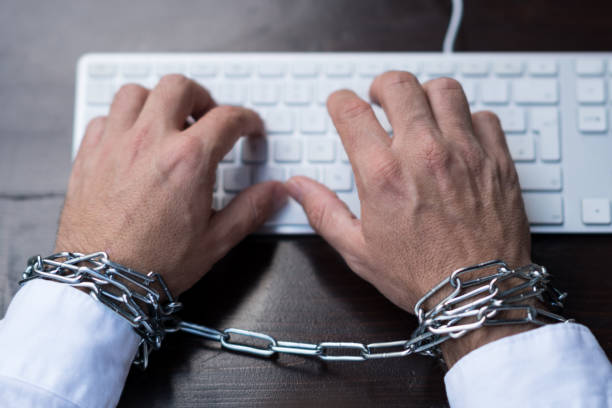Content warning: We discuss some sensitive topics including sexual harassment in this article on revenge porn. We want to inform our readers that the purpose of this post is to raise awareness. It is to promote a deeper understanding of these issue and not to cause distress or harm.
If you feel triggered while reading this post, we encourage you to take a break and prioritise your mental health. We also recommend seeking support from a mental health professional or a trusted friend or family member.
Revenge porn, also known as image-based abuse, is the distribution of intimate/sexually explicit images or videos without the consent of the subject. It can happen to anyone and has become a significant problem in New South Wales, Australia.
According to data from the Cyber Civil Rights Initiative, 90 percent of victims of nonconsensual pornography are women. This article will discuss the legal implications of revenge pornography, governmental measures, its legal implications, and other related information.
Understanding Revenge Porn
Revenge porn is a form of online harassment wherein a person shares intimate images or videos of another person without their consent. In NSW, revenge porn or the non-consensual sharing of intimate images is a criminal offence and a form of domestic violence or sexual violence that can lead to imprisonment and hefty fines.
Non-Consensual Sharing of Intimate Images (NCSII) is the sharing, or threatening to share intimate images or videos of a person without their consent. The images can be shared online or offline and can include any image or video that shows a person’s genital or anal region, or breasts in the case of a female.
Division 15C of the Crimes Act 1900 defines and penalises:
- recording and distributing of intimate images, and
- threatening to record or distribute an intimate image.
It stipulates that “a person who intentionally records or distributes an intimate image of another person without the consent of the person, and knowing the person did not consent to the recording or being reckless as to whether the person consented to the recording, is guilty of an offence. The maximum penalty is 100 penalty units or imprisonment for three years, or both.”
Measures Taken by the NSW Government
There are several measures taken by the NSW government to combat this crime and support victims. In addition to criminalising the offence, the government has a task force to tackle image-based abuse. There is also an online portal where victims can report the crime and access support services
Criminalisation of NCSII
In 2017, the NSW government criminalised the act of recording and sharing intimate images without consent. The Crimes Act 1900 made it a punishable offence with a maximum sentence of three years imprisonment and a hefty fine of $11,000. The government made it clear that NCSII is a serious crime and will not be tolerated in any form.
Establishment of Task Force
The task force comprises law enforcement agencies, legal experts, and victim support groups to investigate and prosecute the offenders. It aims to raise awareness about the issue, provide support to victims, and prosecute offenders.
They work closely with social media platforms to remove offensive material and provide support to the victims. This initiative is a huge help in the speedy resolution of cases and has provided a sense of security to the victims.

Support for Victims
The NSW government provides for available modes of support:
- A hotline for the victims to report the offence and get support. The hotline is available 24/7 and provides free legal advice and counselling to the victims.
- A portal that offers victims aid, support, and advice to help them delete photographs from websites and personal devices, including instructions on how to speak with someone who has their private images in their hands gathering information; and guidance on the relevant Australian revenge porn laws.
Legal Implications of Revenge Porn
The distribution of intimate images or videos without the subject’s consent is a violation of privacy and can cause immense harm and trauma to the victim. It is a form of sexual harassment and can lead to severe emotional distress, loss of employment opportunities, and damage to personal relationships.
In 2017, the NSW government introduced Division 15C of the Crimes Act 1900 that made NCSII a criminal offence punishable by up to three years imprisonment. The law also makes it illegal to threaten to distribute intimate images or videos without the victim’s consent.
Recording an Intimate Image Without Consent (Section 91P)
According to Section 91P, a person who records an intimate image of another person without their consent, or threatens to do so, commits an offence. An intimate image is an image that shows a person’s genital or anal region or shows them engaged in a private act, such as sexual act or showering.
Distributing an Intimate Image Without Consent (Section 91Q)
Section 91Q of the Crimes Act 1900 NSW Australia makes it an offence to intentionally or recklessly distribute an intimate image of another person without their consent. The offence applies to both the physical and digital distribution of the image. The distribution of an intimate image without consent can also lead to reputational damage and social stigma for the victim.
Threatening to Record or Distribute an Intimate Image (Section 91R)
The section states that it is an offence to intentionally or recklessly threaten to record or distribute an intimate image of another person without their consent and with the intention of causing the person distress or humiliation. The court may also issue a restraining order or an apprehended violence order to protect the victim from further harm.
The Act also provides that if a person is found guilty of these acts, they can face up to three years of imprisonment and/or a fine of up to $11,000.
Reporting Revenge Porn
If you are a victim, it is important to know that there are options for reporting the crime.
- You can report it to the police, who will investigate the matter and may press charges against the perpetrator.
- You can also report it to the eSafety Commissioner, who can provide support, advice, and assistance in having the images removed from the internet.
The NSW government recognises the severity of this issue and commits to combat it. The criminalisation of revenge porn, the establishment of a task force, and an online portal for victim support are positive steps toward addressing this heinous crime.
However, it is essential to continue raising awareness about the issue and providing support to victims to ensure that they receive justice and can move forward with their lives.

Seeking Legal Help to Protect Your Reputation and Privacy
A criminal lawyer can provide essential legal assistance to the victims. They can guide them through the legal process and help them understand their rights.
1. Cease and Desist Letters
A lawyer can send a cease-and-desist letter to the person responsible for distributing the images or videos. This letter will demand that the person stop distributing the content and remove it from any platform where it has been posted. If the person fails to comply with the letter, the victim may pursue legal action.
2. Civil Lawsuits
A lawyer can help the victim file a civil lawsuit against the person responsible for distributing the content. The victim can sue for damages, including emotional distress, harm to reputation, and lost income.
3. Criminal Complaints
A lawyer can also assist the victim file a criminal complaint against the person responsible for distributing the content. The lawyer can also assist in gathering evidence and working with law enforcement to build a strong case against criminal offences. This includes revenge pornography and child pornography.
Our team at JB Solicitors can take care of legal matters such as:
- sending cease and desist letters, and
- filing civil and criminal complaints against an offender.
Our criminal lawyers can also provide you with legal advice, representation, and a deeper understanding of criminal laws applicable to revenge porn cases and their impact on your rights.
Contact us now.
